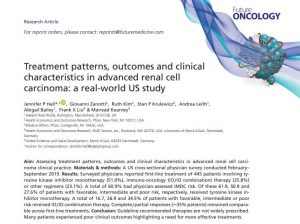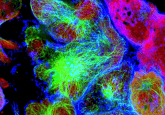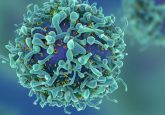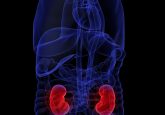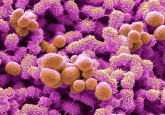Treatment patterns, outcomes and clinical characteristics in advanced renal cell carcinoma: a real-world US study

This article reports a real-world US study that aimed to provide an in-depth understanding of treatment patterns, clinical outcomes and patient characteristics in advanced renal cell carcinoma (aRCC). The authors found that over 75% of first-line patients received either tyrosine kinase inhibitor (TKI) monotherapy or immuno-oncology (IO/IO combination therapy) and TKI monotherapy was received by just over half of all patients, with a further quarter of patients receiving IO/IO combination therapy at time of data collection. The most prevalent first-line treatment, irrespective of International Metastatic RCC Database Consortium (IMDC) risk group, was TKI monotherapy with more than a third of patients treated with TKIs at first-line receiving sunitinib and one third of patients receiving cabozantinib. The study concluded that current guidelines were not widely followed in routine clinical practice with more intermediate IMDC risk patients receiving TKI monotherapy than IO/IO combination therapy.
The latest research article published in Future Oncology reports the treatment patterns, clinical outcomes and patient characteristics in aRCC patients from across the US healthcare setting.
Abstract
Aim: Assessing treatment patterns, outcomes and clinical characteristics in aRCC clinical practice.
Materials & Methods: A US cross-sectional physician survey conducted February–September 2019.
Results: Surveyed physicians reported first-line treatment of 445 patients involving TKI monotherapy (51.0%), IO/IO combination therapy (25.8%) or other regimens (23.1%). A total of 60.9% had physician-assessed IMDC risk. Of these 61.9%, 50.9% and 27.6% of patients with favorable, intermediate and poor risk, respectively, received TKI monotherapy. A total of 16.7%, 26.9% and 34.5% of patients with favorable, intermediate or poor risk received IO/IO combination therapy. Complete/partial responses (~35% patients) remained comparable across first-line treatments.
Conclusions: Guideline-recommended therapies are not widely prescribed. Many patients experienced poor clinical outcomes highlighting a need for more effective treatments.
Lay abstract:
In patients with advanced/late-stage aRCC, a type of kidney cancer that has spread to other parts of the body, the chance of recovery from the disease over time is low. A number of new treatments have become available in recent years, including types of drugs like TKIs new IO/TKI and IO/IO combination therapies. We wanted to know how these drugs are used in clinical practice. We carried out a survey asking physicians various questions such as the age and gender of patients, how long they had aRCC, how they were treated and what their symptoms were. The survey showed that despite being available as treatments, these new drugs were not routinely used as recommended by recently published clinical guidelines. Patients, whose chances of recovering from aRCC were low, were more likely to be given TKIs instead of the new IO/TKI and IO/IO combinations now recommended (resulting in a less than 10% chance that the disease would totally disappear). As healthcare practitioners learn more about these new treatments, it is expected that their use will increase, leading to improved outcomes.
Read the full article:
Register to Oncology Central now for the latest journal content
